Results
-
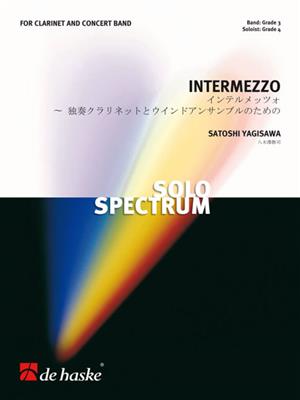 £104.99
£104.99Intermezzo - Satoshi Yagisawa
Intermezzo is the second movement of Satoshi Yagisawa's Clarinet Concerto. The concerto was first performed by Higashi-Hiroshima Wind Ensemble in Hiroshima, Japan in 2010 with guest performer Shinsuke Hashimoto, clarinettist with the Hiroshima Symphony Orchestra and was conducted by Atsushi Kageyama. Inspiration for this work came from the fact that both Satoshi Yagisawa and Shinsuke Hashimoto graduated from Musashino Academia Musicae.Clarinet Concerto>/I> is the pinnacle of Satoshi Yagisawa's "Concerto Series" which also features his Suite Concertante for Piano and WindOrchestra, Trumpet Concerto, Trombone Concerto, Saxophone Concertino, andConcertino for Solo Percussion and Wind Orchestra.Yagisawa's characteristic heartfelt theme in the second movement is especially popular and consequently--entitled Intermezzo--it is often performed independently.Soloist: Grade 4
Estimated dispatch 7-14 working days
-
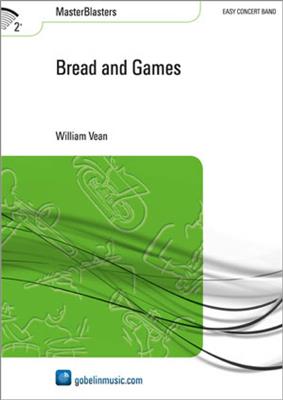 £84.99
£84.99Bread and Games - William Vean
'Panem et Circenses', Bread and Games were essential for keeping the citizens of ancient Rome in check. While the bread was meant for the poorest among the Romans, the Games were Popular Pastime Number One for everybody.There were different kinds of games, such as chariot races (especially popular with female spectators), or wild-beast fights, where lions, tigers, bulls or bears were set on one another or even on human beings. Most popular, however, were the Gladiator fights. In 'Bread and Games' William Vean depicts one of the many fights in the antique Colosseum. 1. Entrance of the Gladiators: By powerful bugle-calls the attention of the peoplewas asked for, after which the Gladiators entered the Arena at the sound of heroic marching-music.2.Swordfight: We can hear that the fights were not mere child's play in this part.On the contrary, they were a matter of life and death and were fought accordingly.3.Mercy of the Emperor: Sometimes a wounded gladiator could be fortunate, depending on the mercy of the audience. Waving one's handkerchief meant mercy, a turned-down thumb meant no pardon. The Emperor had the right to take the final decision, but he usually complied with the wish of the majority of the public. 4.Lap of Honour: Gladiators were mainly selected among slaves, convicted criminals, or prisoners of war. Consequently, winning was very important, as it would mean fame, honour and sometimes even wealth. A lap of honour, therefore, was the winner's due reward.
Estimated dispatch 7-14 working days
-
 £164.99
£164.99Overture for a Special Occasion - Philip Sparke
The special occasion that Philip Sparke was honoured to write this piece for was the 200th anniversary of the Stadtmusik Bad Sckingen. Since Bad Sckingen is known as the 'Trompeterstadt', or trumpeter city, Sparke's creative process was influenced by Joseph Victor Scheffel's poem, Der Trompeter von Sckingen (The Trumpeter from Sckingen), which is based on a true story. The overture starts with a majestic fanfare, followed by a lively molto vivace. It is joined by a brilliant trumpet call in honour of the city's famous resident.
Estimated dispatch 7-14 working days
-
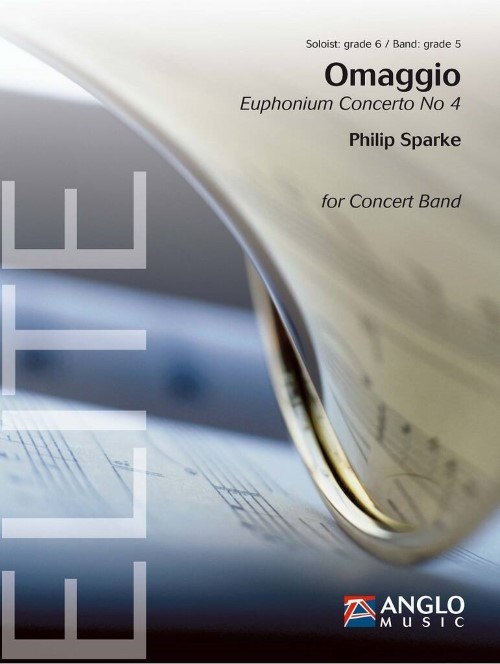 £206.99
£206.99Omaggio (Euphonium Concerto No.4) (Euphonium Solo with Concert Band - Score and Parts)) - Sparke, Philip
Omaggio was commissioned by Steven Mead in celebration of his 60th birthday and in memory of his father, Rex. He gave the premiere of the brass band version in Rome in March 2022, accompanied by the Italian Brass Band conducted by Filippo Cangiamilla. The concert band premiere took place on 6th July that year as part of the 2022 Spanish International Tuba Euphonium Conference, accompanied by the Banda municipal de msica de Malaga.The concerto is set in 3 continuous movements, which are united by a recurring syncopated interval of a fifth. The first movement, Fantasia, opens with this motive accompanying an extended monologue for the soloist. This is followed by a lengthy bridge passage by the band, which is eventually joined by the soloist, who guides the music back to the opening soliloquy, leading to an energetic central section. This develops until the opening material again returns to introduce the second movement, Ballad, which revolves around an expressive melody for the soloist, interspersed by accompanied cadenzas. The third movement, The King Triumphant, pays homage to Steven's late father, Rex, and its title alludes both to Rex's name (Rex being Latin for king) as well as his love of Eric Ball's Salvationist masterpiece, The Kingdom Triumphant. The finale is an energetic tour-de-force featuring an acrobatic 6/8 melody, which is interrupted twice by the magnificent hymn tune, Helmsley, which Ball uses so effectively in The Kingdom Triumphant. A galloping coda brings the work to a close.
Estimated dispatch 7-14 working days
-
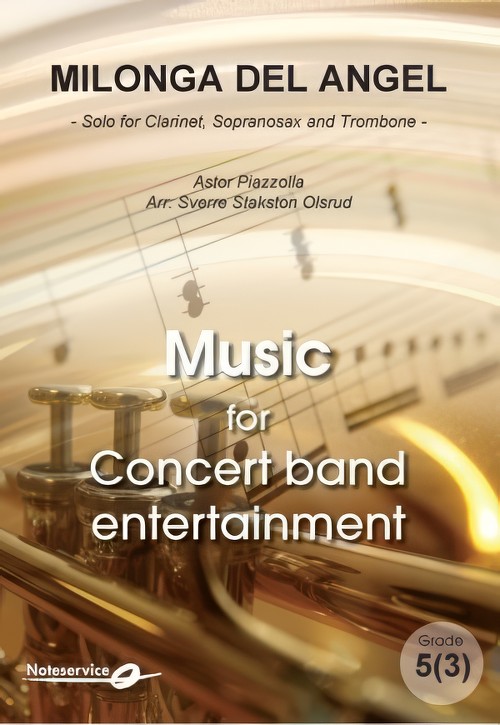 £98.00
£98.00Milonga del Angel (Clarinet, Soprano Saxophone and Trombone Trio with Concert Band - Score and Parts) - Piazzolla, Astor - Olsrud, Sverre Stakston
This arrangement was made after hearing Astor Piazzolla s 1986 recording of his own work written in 1965. The original instrumentation of bandoneon, violin and string bass is here arranged for three wind soloists with Concert Band. The Soprano Sax is the main soloist (filling the bandoneon role), while the trombone and clarinet shares the violin part as a kind of flirting undertone to the soprano saxophone. It s not possible to make a 100% correct notation of the solo parts, so it s recommended to listen to the record album Zero Hour from 1986 to get the best impression of the work. Enjoy Milonga Del Angel and imagine a small, dark cafe in Buenos Aires!
Estimated dispatch 7-14 working days
-
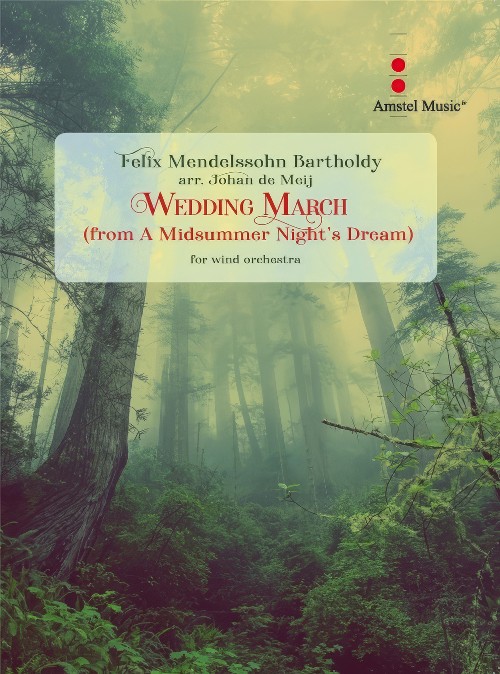 £68.00
£68.00Wedding March (from A Midsummer Night's Dream) (Concert Band - Score and Parts) - Mendelssohn, Felix - De Meij, Johan
Felix Mendelssohn Bartholdy (1809 - 1847) composed the music for William Shakespeare's play A Midsummer Night's Dream at two different times. In 1826, at the age of 16, he wrote a concert overture (Op. 21). Sixteen years later, in 1842, he composed the incidental music (opus 61) for King Frederick William IV of Prussia, in which he incorporated the existing overture. The overture premiered in Stettin (then in Prussia, now Szczecin, Poland) on February 20, 1827, conducted by Carl Loewe. Mendelssohn had to travel 80 miles through a raging snowstorm to get to the concert, which became his first public appearance. The interlude between the 4th and 5th acts of the incidental music is the famous Wedding March, Mendelssohn's most popular and most performed work. Duration: 4.30
Estimated dispatch 7-14 working days
-
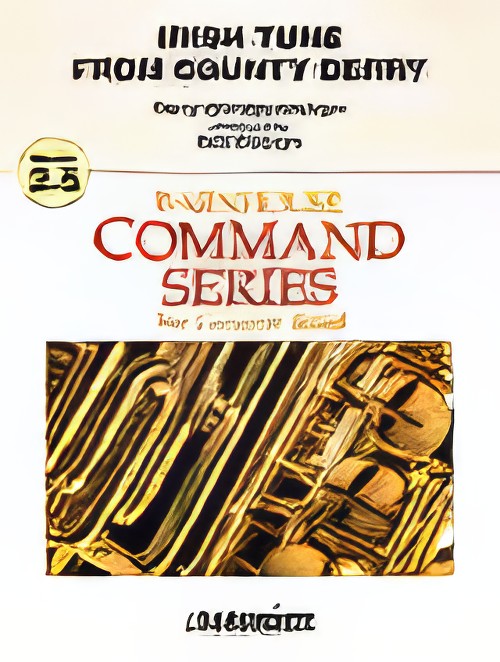 £59.00
£59.00Irish Tune from County Derry (Concert Band - Score and Parts) - Grainger, Percy Aldridge - Romeyn, Rob
Percy Grainger's "Irish Tune from County Derry" is unquestionably one of the most beloved standards of the concert band repertoire. Rob Romeyn's brilliant arrangement for the Command series of this iconic work has been skillfully and carefully adapted to better fit the instrumentation of a smaller ensemble, thus allowing the piece to be performed effectively by many more bands who would otherwise not have the opportunity. All of Grainger's iconic melodic and harmonic lines and harmonic structure are present and left intact. We predict this wonderful arrangement will become a classic and will be a valuable addition to the repertoire for many years to come. Great music for younger performers! Duration: 4.15
Estimated dispatch 7-14 working days
-
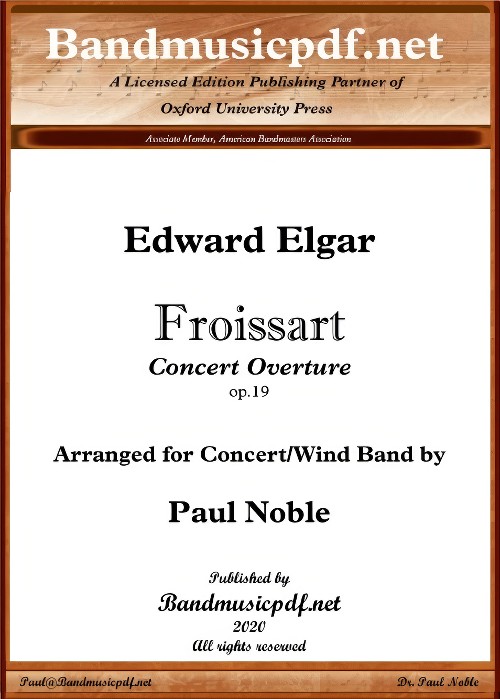 £150.00
£150.00Froissart (Concert Band - Score and Parts) - Elgar, Edward - Noble, Paul
Froissart, Op. 19, is a concert overture by Edward Elgar, inspired by the 14th-century Chronicles of Jean Froissart. Elgar was first attracted to the Chronicles after finding mention of them in Walter Scott's Old Mortality. Jean Froissart (c. 1337 - c.1405), often referred to in English as John Froissart, was a medieval French chronicle writer. For centuries, Froissart's Chronicles have been recognized as the chief expression of the chivalric revival of the 14th century Kingdom of England and France. The motto written by Elgar on the manuscript score is a quotation from an 1817 poem by Keats: 'When Chivalry lifted up her lance on high.' Froissart is not a programmatic work: unlike the later Falstaff or even Cockaigne it does not tell a detailed story; it evokes a mood and manner in broad terms. The drama of the dynamics enhances the haunting melodies that identify Elgar's compositions.
Estimated dispatch 7-14 working days
-
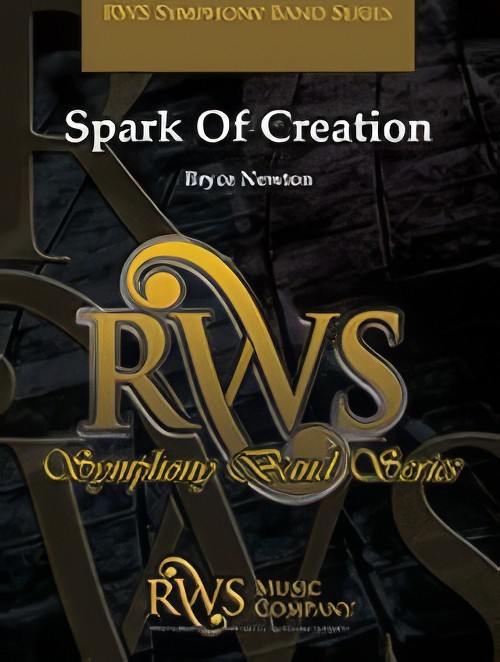 £130.00
£130.00Spark of Creation (Concert Band - Score and Parts) - Newton, Bryce
Depicting the creative work of American inventor Charles F. Kettering, Bryce Newton's Spark of Creation portrays the relentlessly inventive nature of Kettering's mind. After a bold and driving introduction, the piece gives way to a lush chorale, symbolic of the success and extreme merit of Kettering's contributions to our modern society. Spark of Creation merges history, music and the curiosity of the human mind into a setting that your students and audiences will thoroughly enjoy. An outstanding selection for festivals and contests! Duration: 4.30
Estimated dispatch 7-14 working days
-
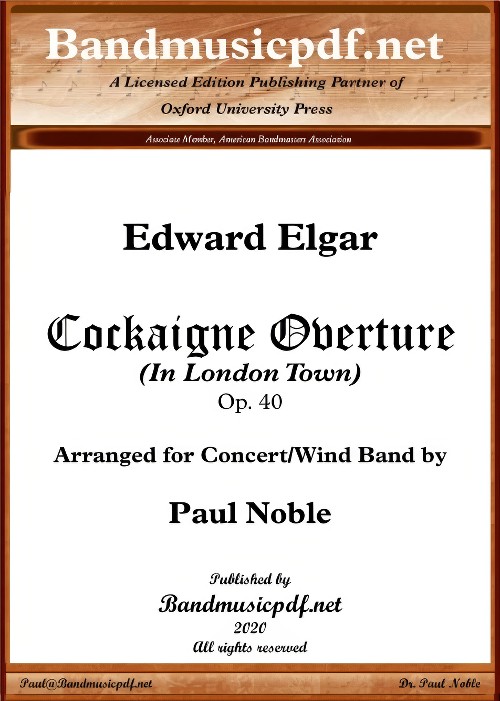 £150.00
£150.00Cockaigne Overture (In London Town) (Concert Band - Score and Parts) - Elgar, Edward - Noble, Paul
Cockaigne Overture was composed when Edward Elgar received a commission from the Royal Philharmonic Society, and he reported that the new piece was "cheerful and Londony, 'stout and steaky'...honest, healthy, humorous and strong, but not vulgar." The first performance was in the Queen's Hall, London, on 20 June 1901, conducted by the composer. He dedicated the work to his "many friends, the members of British orchestras." The music was an immediate success and became one of Elgar's most popular works. In its 15 minutes or so, the overture gives a lively and colourful musical portrait of Edwardian London. 'Cockaigne' was a term used by moralists at that time as a metaphor for gluttony and drunkenness, while Britain adopted the name humorously for London, and from it we get the Cockney. Cockaigne or Cockayne /ka' kein/, the word origin tracing back to the 13th century, is a land of plenty in medieval myth, an imaginary place of extreme luxury and ease where physical comforts and pleasures are always immediately at hand and where the harshness of medieval peasant life does not exist. The work presents various aspects of turn-of-the-century London and Londoners. It begins with a quiet but bustling theme which leads into an unbroken sequence of snapshots: the cockneys, the church bells, the romantic couples, a slightly ragged brass band (perhaps the Salvation Army) and a contrastingly grand and imperious military band. The broad theme representing Londoners has been stated as the first occurrence of Elgar's trademark direction, 'nobilmente.' The work ends in a characteristically Elgarian blaze of sound, including an optional full organ.
Estimated dispatch 7-14 working days
